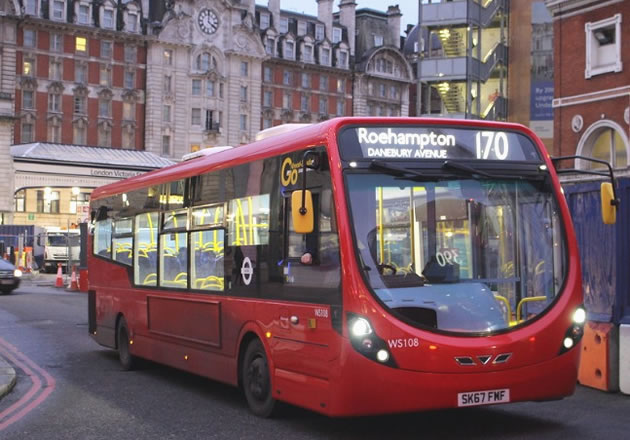Bus Drivers Say 24/7 Lanes Not Enough
They want priority signals at busy road junctions as well

Picture: Wandsworth Council
London Bus drivers have welcomed the news that bus lanes will become 24/7, but some argue they should also have separate traffic lights for buses at busy junctions.
The capital’s bus lanes currently operate from 7am to 7pm, Monday to Sunday, with fines of up to £130 for drivers who enter them.
Announcing the change on 21 July, Transport for London (TfL) said the policy will bring about a “sustainable” economic recovery from the pandemic.
TfL hopes that encouraging people to use buses will make roads less busy, which in turn would make roads safer for cyclists and cause less pollution.
Joanne Harris, a bus driver whose route goes through South West London, said her colleagues have wanted the change for years, but believe TfL could go further.
“The change is much appreciated. Bus drivers had been calling for it for a long time, maybe the last 10 years,” said Ms Harris, 63, who is also a Unite trade union organiser.
“The rules at lights have changed over the years. If you go back to when they began, a lot of places would have been closed on a Sunday. Whereas these days we’re more of a 24/7 city.
“So yes, to the bus drivers, there was no point stopping the bus lanes at 7pm when there was still so much traffic.”
The Fulham resident also called for bus lanes to continue up to busy junctions, to avoid buses having to merge into single lanes. She suggested bus lanes could have their own sets of traffic lights, timed with a “head start”, to stop buses getting caught behind other motor vehicles.
“The lines should run all the way up to traffic lights and have their own sets of lights with a few seconds’ head start from the cars,” Ms Harris said. “Otherwise buses can get stuck.
“Many people complain about the unreliability of buses, but is it any surprise when there’s so much traffic to compete with.”
TfL said a trial of the 24/7 bus lane policy will begin in “late summer”. An official date has yet to be confirmed.
It is understood that TfL is less keen on the idea of having bus lanes at junctions because it worries this could cause problems for vehicles wishing to turn left across a bus lane.
Claire Mann, TfL’s director of bus operations, said: “Making bus journey times faster and more reliable, alongside enabling more people to walk and cycle, is more important than ever if London is to avoid a car-led recovery from coronavirus.”
She also said the transport body has another form of technology designed to help buses at thousands of junctions across London, that many Londoners may not be aware of.
“We have previously installed bus priority technology at more than 1,900 junctions across London, which automatically detects buses approaching and gives them an advantage by increasing the length of the green-light time if the bus is running behind schedule,” Ms Mann said.
“Customers on buses benefit from this more than 140,000 times a day and we’ll continue to work on other measures to make buses more reliable, including our trial of 24/7 bus lanes.”
Owen Sheppard - Local Democracy Reporter
August 4, 2020